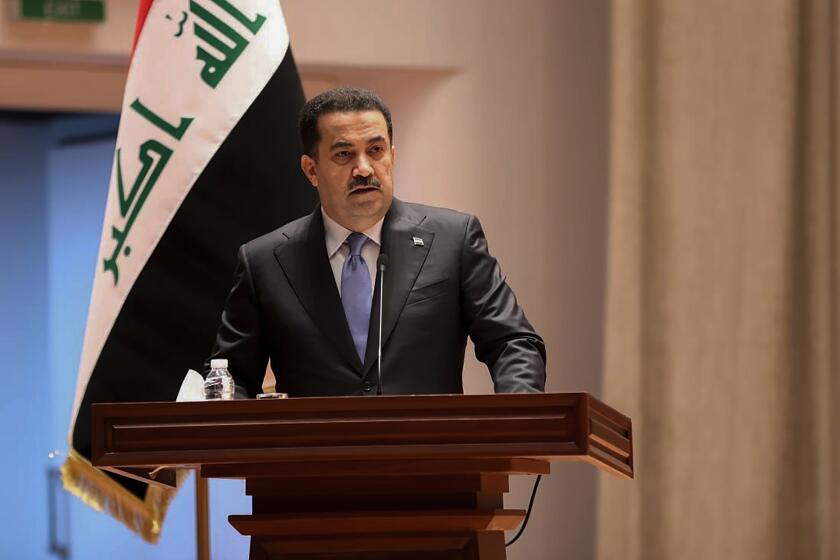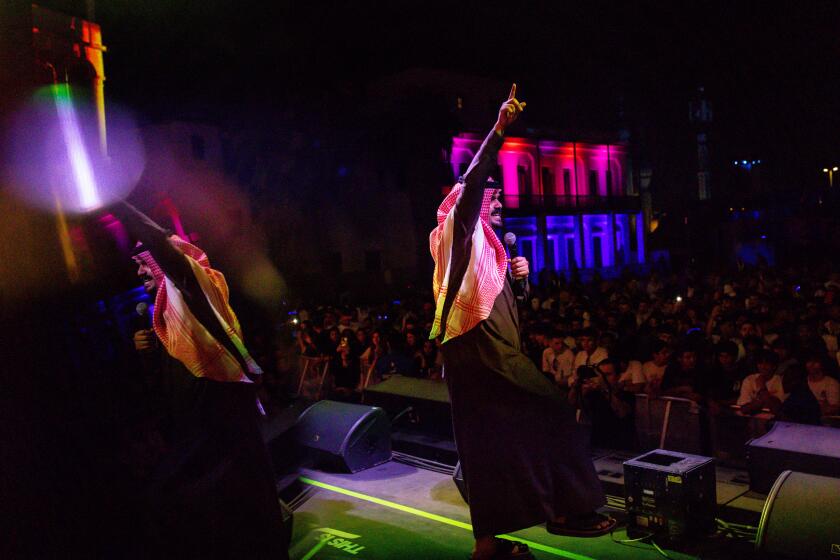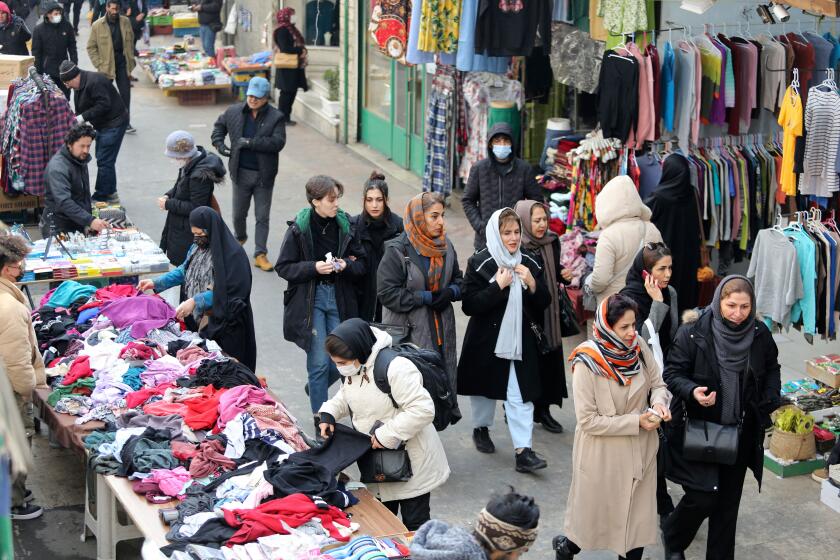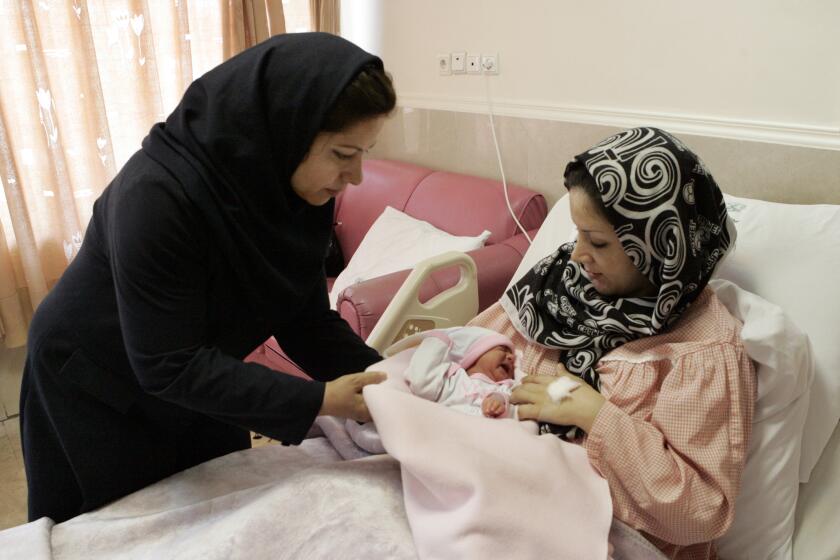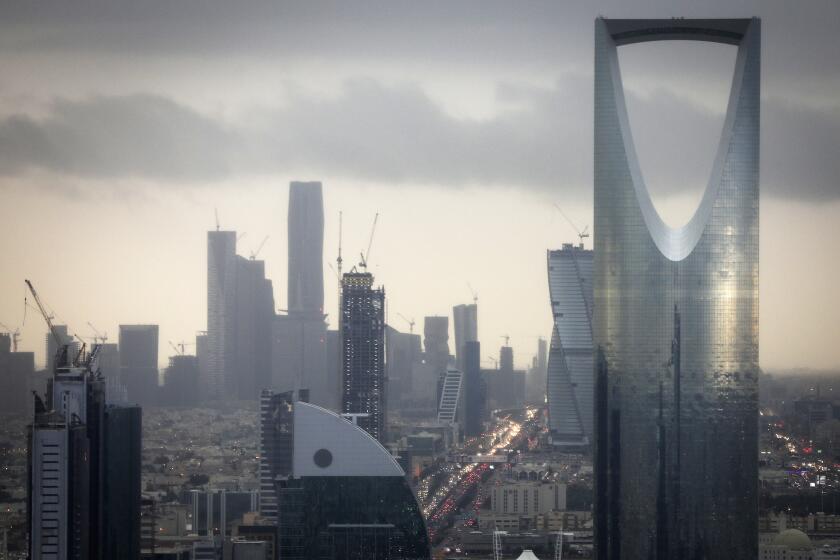Iran and Saudi Arabia agree to revive diplomatic ties after years of tensions
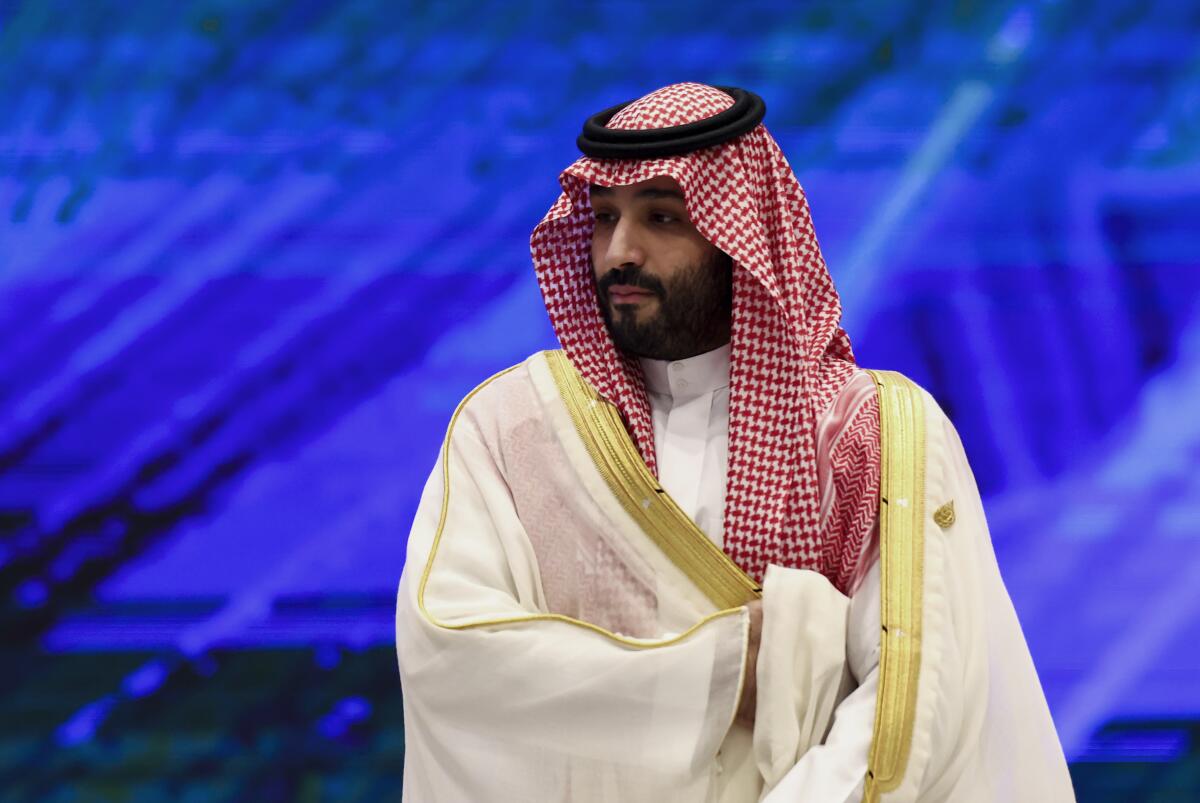
- Share via
DUBAI — Iran and Saudi Arabia agreed Friday to reestablish diplomatic relations and reopen embassies after seven years of tensions — a major diplomatic breakthrough, negotiated with China, that lowers the chance of armed conflict between the Mideast rivals, both directly and in proxy conflicts around the region.
The deal, struck in Beijing this week amid China’s ceremonial National People’s Congress, represents a major diplomatic victory for the Chinese government as Persian Gulf states perceive the United States to be slowly withdrawing from the wider Middle East. It also comes as diplomats have been trying to end a years-long war in Yemen, a conflict in which both Iran and Saudi Arabia are deeply entrenched.
The two countries released a joint communique with China, which apparently brokered the agreement as President Xi Jinping was awarded a third five-year term as leader earlier Friday.
Iranian state media posted images and video that it described as being taken in China of the meeting. It showed Ali Shamkhani, the secretary of Iran’s Supreme National Security Council, with Saudi national security advisor Musaad bin Mohammed Aiban and Wang Yi, China’s most senior diplomat.
“After implementing of the decision, the foreign ministers of both nations will meet to prepare for exchange of ambassadors,” Iranian state television said. It added that the talks had been held over four days.
The joint statement calls for the reestablishing of ties and the reopening of embassies to happen “within a maximum period of two months.”
The talks had been lauded as a breakthrough that would ease regional tensions, but Tehran is now refusing to meet with Saudi officials, officials say.
In the footage aired by Iranian media, Wang could be heard offering “wholehearted congratulations” on the two countries’ “wisdom.”
“Both sides have displayed sincerity,” he said. “China fully supports this agreement.”
China, which recently hosted Iran’s hard-line President Ebrahim Raisi, is also a top purchaser of Saudi oil. Xi visited Riyadh in December to attend meetings with oil-rich Gulf Arab nations crucial to China’s energy supplies.
Iran’s state-run IRNA news agency quoted Shamkhani as calling the talks “clear, transparent, comprehensive and constructive.”
Young Saudis are letting loose at new state-sponsored social and cultural events even as the government cracks down harshly on political dissent.
“Removing misunderstandings and the future-oriented views in relations between Tehran and Riyadh will definitely lead to improving regional stability and security, as well as increasing cooperation among Persian Gulf nations and the world of Islam for managing current challenges,” Shamkhani was quoted as saying.
Aiban thanked Iraq and Oman for mediating talks between Iran and the kingdom, according to a transcript of his remarks published by the state-run Saudi Press Agency.
“While we value what we have reached, we hope that we will continue ... the constructive dialogue,” Aiban said.
Tensions long have been high between Iran and Saudi Arabia. The kingdom broke off ties with Iran in 2016 after protesters invaded Saudi diplomatic posts there. Saudi Arabia days earlier had executed a prominent Shiite cleric, triggering the demonstrations.
Saudi Crown Prince Mohammed bin Salman wants to diversify the economy and open up the culture of his country. Coffee is part of his strategy.
The execution came as Crown Prince Mohammed bin Salman, then a deputy, began his rise to power. The son of King Salman, Prince Mohammed at one point compared Iran’s Supreme Leader Ayatollah Ali Khamenei to Nazi Germany’s Adolf Hitler, and also threatened to strike Iran.
In the years since, the United States unilaterally withdrew from Iran’s nuclear deal with world powers in 2018. Since then, Iran has been blamed for a series of attacks, including one that targeted the heart of Saudi Arabia’s oil industry in 2019, temporarily halving the kingdom’s crude production.
Though Yemen’s Iranian-backed Houthi rebels initially claimed responsibility for the attack, Western nations and experts have blamed the attack directly on Tehran. Iran has long denied responsibility. It has also denied carrying out other assaults attributed to it by others.
Beyond the regional politics, religion also plays a key role. Saudi Arabia, home to the cube-shaped Kaaba that Muslims pray toward five times a day, has long portrayed itself as the world’s leading Sunni nation. Iran’s theocracy views itself as the protector of Islam’s Shiite minority.
Iranians are finding it harder than ever to afford even basic goods as political unrest roils the country and the government cracks down harshly.
The two powerhouses also have competing interests elsewhere, such as in the turmoil gripping Lebanon and in the rebuilding of Iraq after decades of war following the U.S.-led 2003 invasion that toppled Saddam Hussein.
Hassan Nasrallah, the leader of the Iranian-backed Lebanese militia and political group Hezbollah, praised Friday’s agreement as “an important development” that could “open new horizons” in Lebanon, Syria and Yemen. Iraq, Oman and the United Arab Emirates also praised the accord.
Kristian Ulrichsen, a research fellow at Rice University’s Baker Institute who long has studied the region, said Saudi Arabia’s agreement with Iran came after the United Arab Emirates reached a similar understanding with Tehran.
“This dialing down of tensions and de-escalation has been underway for three years, and this was triggered by Saudi acknowledgment in their view that without unconditional U.S. backing they were unable to project power vis-a-vis Iran and the rest of the region,” he said.
Start your day right
Sign up for Essential California for the L.A. Times biggest news, features and recommendations in your inbox six days a week.
You may occasionally receive promotional content from the Los Angeles Times.
Prince Mohammed, now focused on massive construction projects in his own country, likely wants to pull out of the Yemen war as well, Ulrichsen added.
“Instability could do a lot of damage to his plans,” he said.
The Houthis seized Yemen’s capital, Sana, in September 2014 and forced the internationally recognized government into exile in Saudi Arabia. A Saudi-led coalition armed with U.S. weaponry and intelligence entered the war on the side of Yemen’s exiled government in March 2015. Years of inconclusive fighting has created a humanitarian disaster and pushed the Arab world’s poorest nation to the brink of famine.
A six-month cease-fire in Yemen’s war, the longest of the conflict, expired in October despite diplomatic efforts to renew it. That led to fears that the war could again escalate. More than 150,000 people have been killed in Yemen during the fighting, including more than 14,500 civilians.
Alarmed by the nation’s low birth rate, the Iranian government is encouraging childbearing and imposing restrictions on abortion and contraception.
In recent months, negotiations have been ongoing, including in Oman, a longtime interlocutor between Iran and the U.S. Some are hoping for an agreement ahead of the holy Muslim month of Ramadan, which will begin later in March. Iran and Saudi Arabia have held off-and-on talks in recent years, but it wasn’t immediately clear whether Yemen was the impetus for this new rapprochement.
A Houthi rebel spokesman, Mohamed Abdulsalam, appeared to welcome Friday’s deal in a statement that slammed the U.S. and Israel. “The region needs the return of normal relations between its countries, through which the Islamic society can regain its lost security as a result of the foreign interventions, led by the Zionists and Americans,″ he wrote online.
For Israel, which has wanted to normalize relations with Saudi Arabia despite Palestinians remaining without a state of their own, the easing of tensions between Riyadh and Tehran could complicate its own calculations in the region.
Israeli Prime Minister Benjamin Netanyahu, under pressure politically at home, has threatened to take military action against Iran’s nuclear program as it enriches uranium closer than ever to weapons-grade levels. Riyadh’s rapprochement with Tehran takes a potential ally for a strike off the table. Netanyahu’s government offered no immediate comment Friday to the news.
Saudi Arabia is gambling on a gargantuan building boom to remake its image and economy, but history offers cautionary tales over such ambitions.
It remains unclear what this means for the U.S. Though long viewed as guaranteeing Mideast energy security, regional leaders have grown increasingly wary of Washington’s intentions after its chaotic 2021 withdrawal from Afghanistan. The U.S. State Department did not immediately respond to a request for comment over the announced deal.
However, the White House bristled at the notion that a Saudi-Iran agreement brokered in Beijing suggests a rise of Chinese influence in the Mideast.
“I would stridently push back on this idea that we’re stepping back in the Middle East — far from it,” National Security Council spokesman John Kirby said.
He added: “It really does remain to be seen whether the Iranians are going to honor their side of the deal. This is not a regime that typically honors its word.”
More to Read
Sign up for Essential California
The most important California stories and recommendations in your inbox every morning.
You may occasionally receive promotional content from the Los Angeles Times.
